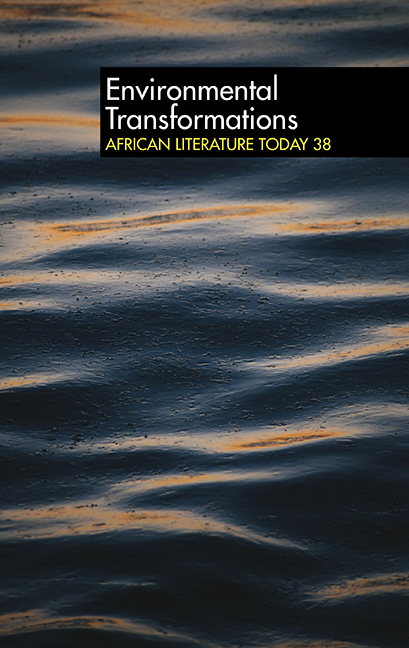Book contents
- Frontmatter
- Contents
- Notes on Contributors
- Introduction: Itinerariesof African Ecocriticism and Environmental Transformations in African Literature
- Literary Totemism and its Relevance for Animal Advocacy: A Zoocritical Engagement with Kofi Anyidoho’s Literary Bees
- Reading for Background: Suyi Davies Okungbowa’s David Mogo, Godhunter and ‘the end of the world as we know it’
- Poetics of Landscape: Representation of Lagos as a ‘Modernizing’ City in Nigerian Poetry
- Poetic Style and Anthropogenic Ecological Adversity in Steve Chimombo’s Poems
- Female Autonomy in Kaine Agary’s Yellow-Yellow
- Local Collisions: Oil on Water, Postcolonial Ecocriticism, and the Politics of Form
- ‘It is the Writer’s Place to Stand with the Oppressed’: Anthropocene Discourses in John Ngong Kum Ngong’s Blot on the Landscape and The Tears of the Earth
- Black Atlantic Futurism, Toxic Discourses and Decolonizing the Anthropocene in Nnedi Okorafor’s The Book of Phoenix
- Readings into the Plantationocene: From the Slave Narrative of Charles Ball to the Speculative Histories of Octavia Butler and Nnedi Okorafor
- INTERVIEW
- LITERARY SUPPLEMENT
- TRIBUTE
- REVIEWS
Pa Gabriel Okara (1918–2019): An African Literary Colossus on Ancestral Journey
Published online by Cambridge University Press: 07 November 2020
- Frontmatter
- Contents
- Notes on Contributors
- Introduction: Itinerariesof African Ecocriticism and Environmental Transformations in African Literature
- Literary Totemism and its Relevance for Animal Advocacy: A Zoocritical Engagement with Kofi Anyidoho’s Literary Bees
- Reading for Background: Suyi Davies Okungbowa’s David Mogo, Godhunter and ‘the end of the world as we know it’
- Poetics of Landscape: Representation of Lagos as a ‘Modernizing’ City in Nigerian Poetry
- Poetic Style and Anthropogenic Ecological Adversity in Steve Chimombo’s Poems
- Female Autonomy in Kaine Agary’s Yellow-Yellow
- Local Collisions: Oil on Water, Postcolonial Ecocriticism, and the Politics of Form
- ‘It is the Writer’s Place to Stand with the Oppressed’: Anthropocene Discourses in John Ngong Kum Ngong’s Blot on the Landscape and The Tears of the Earth
- Black Atlantic Futurism, Toxic Discourses and Decolonizing the Anthropocene in Nnedi Okorafor’s The Book of Phoenix
- Readings into the Plantationocene: From the Slave Narrative of Charles Ball to the Speculative Histories of Octavia Butler and Nnedi Okorafor
- INTERVIEW
- LITERARY SUPPLEMENT
- TRIBUTE
- REVIEWS
Summary
‘Na wetin happen?’, ‘Person die?’, ‘Take am easy oo, you hear?’ Each of these consolatory reactions in pidgin was laced with ‘sorry’. They were actually some of the traditional strings of sympathies that were meant to console me the day Prof. Ernest Emenyonu broke the news that Gabriel Imomotimi Gbaingbain Okara had started the journey to join his forefathers. As at the time of the call I was on a busy street in Port Harcourt, these strings of consolations were apparently triggered by my involuntary exclamation that loudly suggested pain and regret for losing a loved one. These sympathizers were fellow Nigerians within earshot. Though most of them never bothered to inquire whose death it was, they were instinctively responding to the Nigerian traditional ethos at the slightest indication that someone lost someone. In other words, the ‘sorry’ is not the exclusive condolence ritual of close relatives, it can come from strangers who are just meeting you for the first time in the south-eastern part of Nigeria. My involuntary exclamation that day was natural since only a few weeks earlier I had accompanied Prof. Emenyonu on a visit to Okara's residence at Yenagoa, the capital of Bayelsa, his home State, while he was still alive. I could still almost touch the warm reception his daughter Timi Schiller gave us on that memorable day. But now when I think of the above drama (quite amusing, I suppose), which I would not mind entitling ‘Sorry,’ I am compelled to wonder aloud: What an interesting intellectual site it will be for researchers as to the various dramatic ways people instinctively react to death news!
Indeed, it is a reality that we lost another of Africa's literary legends when I was, incidentally at the time of his death, studying his collection of articles: As I See It. One of the remarkable things I had noted in my study of these stories, extracted from the Sunday Tide of the then Rivers State Newspapers Corporation, is that each comes with a certain degree of humour capable of concealing the author's message. In each, Okara tells Nigerians and Africans, in a soothing manner, of their precarious socio-political predicaments without necessarily tickling that corner of their psyche where fear and hopelessness reside.
- Type
- Chapter
- Information
- ALT 38 Environmental TransformationsAfrican Literature Today, pp. 170 - 175Publisher: Boydell & BrewerPrint publication year: 2020



